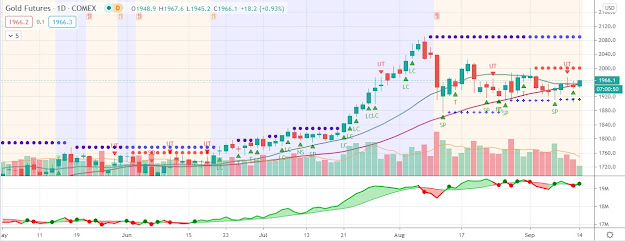Why the gold price may fall
 The gold price broke down through $1,700 per ounce Tuesday and bound back above 1,700 on Wednesday morning as global financial markets convulsed on fresh worries out of Europe. The gold price fell $27.90 to $1687 per ounce after Greek Prime Minister Papandreou announced he would he hold a referendum on Europe’s bailout plan. Stock markets in Europe plunged on concerns over an imminent Greek default and what the potential consequences of a disorderly default might mean. S&P stock futures fell 37.00 to 1212.30 while crude oil fell 3.8% to $89.61 per barrel.
The gold price broke down through $1,700 per ounce Tuesday and bound back above 1,700 on Wednesday morning as global financial markets convulsed on fresh worries out of Europe. The gold price fell $27.90 to $1687 per ounce after Greek Prime Minister Papandreou announced he would he hold a referendum on Europe’s bailout plan. Stock markets in Europe plunged on concerns over an imminent Greek default and what the potential consequences of a disorderly default might mean. S&P stock futures fell 37.00 to 1212.30 while crude oil fell 3.8% to $89.61 per barrel.Commenting on the gold price weakness, Macquarie analyst Stephen Harris wrote in a report published on Monday that “There has been some speculation in recent weeks about the potential for the central banks of heavily indebted European countries to sell their gold holdings and use the proceeds to pay down government debt. This speculation has been used both as an argument for why the gold price may fall and as a potential solution for addressing global sovereign risk concerns and helping to restore growth in developed economies.”
Harris disagreed with this assertion, noting his belief that “any gold sales by central banks are unlikely now and in the foreseeable future” for a myriad of reasons. These included the fact that the value of these nations’ gold holdings is too small to have a material impact on debt outstanding. Additionally, Harris contended that such a measure would flash a clear warning sign that worsens the “perception of a nation’s financial position.” Lastly, the Macquarie analyst asserted that “money printing works better” as long as credit markets are willing to continue to “accept central bank participation.”
Harris argued that the small likelihood of central bank gold sales, coupled with ongoing accommodative monetary policies in Europe and the U.S., is likely to drive gold prices higher. He noted that the gold price has historically risen 25% per annum when U.S. real short interest rates are negative, as is presently the case. “Thus, global easing and currency debasement will continue creating a bullish backdrop in the months ahead.”



Comments
Post a Comment